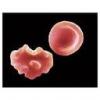Reputation Activity
-
 Malcolm Needs reacted to galvania in IVF Patients
Malcolm Needs reacted to galvania in IVF Patients
Dear Desta
If this is a real case, then I am always amazed that clinics practising IVF don't look into the aspect of antibodies more closely. I knew of a case recently where a woman with anti-U was advised not to have any more children, so went to a clininc for IVF (from sperm from a U+ donor) and was an absolute nightmare for the local transfusionservice who had to cope with the inevitable damage.
I think in this case, you might get away with it as anti-e does not usually cause severe HDN - but on the other hand, the baby will have to be homozygous for the e antigen, so this is not a normal situation. Also, as the surrogate has already formed 2 antibodies she could easily form more to blood groups from other systems. I hope at least that neither of the donors is K+!
I would say - keep an eye open for developing antibodies and boosting of the existing ones.
-
 Malcolm Needs reacted to galvania in Questions about a potential A subgroup
Malcolm Needs reacted to galvania in Questions about a potential A subgroup
Dear Amy
There are two possibilities here.
1. This patient is an A2B (or a weaker subgroup of A - maybe an A3) without an anti-A1. Not all patients with weak A subgroups have an anti-A1. About 20% of A2B individuals would be expected to have an anti-A1 - that still leaves the majority without. The anti-A1 is naturally occurring.
2a. If the patient has a 'haematological' cancer, it is well-known that the ABO antigens can be affected: They often return to full strength when the patient is in remission
2b. If the patient has a stomach or bowel cancer, he may be producing excess soluble A substance which may be blocking the reaction between the A antigen and the anti-A.
As this patient is a group AB you should not really be giving group O. If you don't like the idea of transfusing AB then group B would be the group of choice - but I don't see any problem with issuing AB for this patient.
-
 Malcolm Needs reacted to SMW in Question about A subgroup
Malcolm Needs reacted to SMW in Question about A subgroup
Hi Amy--thanks for sharing your case. The results you report suggest the patient may be an A2B. The overwhelming majority of A2B (and A2) individuals do NOT produce an anti-A1, which if present is generally naturally occurring as you noted. Although anti-A1 is somewhat more frequent in A2B than A2 individuals, in the absence of a 37C reactive anti-A1, it is completely safe to transfuse group AB, A or B blood and is actually preferable to using group O units. The use of group O Red Blood Cell units would not be expected to be harmful to the patient, however since group O units are generally in limited supply, their out-of-group use is judicially reserved for those patients that must receive group O units.
-
 Malcolm Needs reacted to David Saikin in K-B stain
Malcolm Needs reacted to David Saikin in K-B stain
I have only ever stocked the large dose of RhIg - why risk giving the smaller dose. The cost is the same (for me anyway) so I'm not harming the pt/mother in anyway with the larger dose (300ug)regardless of gestational age. As I stated above - the KB stain looks for fetal cells; the docs want to see if the placental circulation is compromised. Forget the rosette. (and I forget the samller dose; the docs have no choice in the mattter and I have never had a problem in a 700+ bed tertiary care hosp with busy ED and neonatal unit; a 350+ bed with busy maternity/ED; and a small 24 bed with busy Maternity/ED). Give the docs what they need 'cuz they are not always correct in what they want.
-
 Malcolm Needs got a reaction from EDibble in Why we do not have Micro in the Blood Bank
Malcolm Needs got a reaction from EDibble in Why we do not have Micro in the Blood Bank
I, too, know little or nothing (probably nothing) about microbiology, BUT, I would not, therefore, put my views forward on matters microbiological. Sadly, it is often the case that someone who knows nothing about blood transfusion think that it is their prerogative to give their views, as "blood transfusion is easy", with only 4 ABO blood groups and D+ or D-. These are also usually the exact same people who are unwilling to work in Blood Bank, because they fear killing someone!!!!!!!!!!!!
-
 Malcolm Needs got a reaction from Sandy L in Requiring two nurses at bedside verification
Malcolm Needs got a reaction from Sandy L in Requiring two nurses at bedside verification
True SMILLER, but, if the system forces you to scan the patient's arm/ankle band, so that there is bedside printing (or whatever) it more difficult to fool the system (although, I am absolutely certain, not impossible - human beings will find ANY way of getting around things). There is a lovely saying, "This system is fool proof, but it is not idiot proof"!
-
 Malcolm Needs got a reaction from Sandy L in Requiring two nurses at bedside verification
Malcolm Needs got a reaction from Sandy L in Requiring two nurses at bedside verification
I agree 100% Marilyn.
Numerous studies have shown that multiple checking leads to more errors. This is because human nature, either as a matter of fact or maliciously, leads to checks being done badly (not at all) because there is a "feeling" that, well, if I miss something, the next person will pick it up, or, conversely, well, there can't be any errors, because they would have been picked up by the person who checked before me. On top of that, of course, there are checks that are done under great pressure of work, or when very tired, when a genuine error is made because of the circumstances.
The great thing is that, if computer programmes are written properly (and it is an "if"), computers do not feel either "pressure of work of circumstances" or cannot make mistakes because "they are tired".
Take the human out of it, and it is normally better; that's why electronic issue (under "normal" circumstances) is safer than a serological cross-match.
-
 Malcolm Needs got a reaction from tkakin in Requiring two nurses at bedside verification
Malcolm Needs got a reaction from tkakin in Requiring two nurses at bedside verification
I agree 100% Marilyn.
Numerous studies have shown that multiple checking leads to more errors. This is because human nature, either as a matter of fact or maliciously, leads to checks being done badly (not at all) because there is a "feeling" that, well, if I miss something, the next person will pick it up, or, conversely, well, there can't be any errors, because they would have been picked up by the person who checked before me. On top of that, of course, there are checks that are done under great pressure of work, or when very tired, when a genuine error is made because of the circumstances.
The great thing is that, if computer programmes are written properly (and it is an "if"), computers do not feel either "pressure of work of circumstances" or cannot make mistakes because "they are tired".
Take the human out of it, and it is normally better; that's why electronic issue (under "normal" circumstances) is safer than a serological cross-match.
-
 Malcolm Needs reacted to tricore in Why we do not have Micro in the Blood Bank
Malcolm Needs reacted to tricore in Why we do not have Micro in the Blood Bank
I don't mind a microbiologist who doesn't know much about blood bank. I certainly don't know much about micro. I worry when the people who are working in blood bank don't have basic BB knowledge.
-
 Malcolm Needs reacted to Eoin in Pathology Quality Review
Malcolm Needs reacted to Eoin in Pathology Quality Review
I was at the Frontiers in Laboratory Medicine where the report was launched.
Great ideas - a small, readable report with recommendations. I think it is very good.
Link is http://www.england.nhs.uk/wp-content/uploads/2014/01/path-qa-review.pdf
Cheers
W Eoin
-
 Malcolm Needs reacted to aafrin in Requiring two nurses at bedside verification
Malcolm Needs reacted to aafrin in Requiring two nurses at bedside verification
I fully concur with you Malcolm; for I have noticed it many times that ---
"Foolproof systems do not take into account the ingenuity of fools."
-
 Malcolm Needs reacted to MAGNUM in Why we do not have Micro in the Blood Bank
Malcolm Needs reacted to MAGNUM in Why we do not have Micro in the Blood Bank
Another tech and myself were discussing the possibility of insuring that a patient that was sent to the OR prior to any pre-OP testing was done. It just so happens that this patient is a known patient that has a known Jka. We were discussing what would be the outcome if they suddenly had to have units on the patient. The Micro supervisor was sitting close by, and remarked "Well cant you just give them some O Negs?" We nearly broke our necks swinging them around to see who had uttered such a ignorant comment. She even went so far to say that the O Negs would be best because they did not have any antibodies in them. Now, I could have expected a nurse to come up with a comment such as this, but a Med Tech with over 50 years of experience.
Any other "ignorance" going on out in BB world?
-
 Malcolm Needs got a reaction from EDibble in Delayed Transfusion Reaction, anti-C
Malcolm Needs got a reaction from EDibble in Delayed Transfusion Reaction, anti-C
Ah, that explains it goodchild.
e variant (which you told us about) and I went down the road of anti-HrB or anti-HrS at one point.
I really should have thought of anti-hrB or anti-hrS (rather than the upper cases "H"'s).
In the case of both anti-hrB and anti-hrS, although the antibody is, if you like, directed against a bit of the "normal e antigen" (rather like the anti-D in a D variant is directed against a "bit of the D antigen that is missing" (actually a "normal bit of the D antigen" that the patient lacks, because of a mutation), the antibody seems to react more strongly with Ce+ red cells than either C-e+ red cells, or C+e- red cells, which would explain the apparent anti-C.
The other antibody specificities served to throw me a bit; and they shouldn't have done. Smack on the wrist for me!
Really great Case Study. Thank you!
-
 Malcolm Needs got a reaction from tbostock in Requiring two nurses at bedside verification
Malcolm Needs got a reaction from tbostock in Requiring two nurses at bedside verification
True SMILLER, but, if the system forces you to scan the patient's arm/ankle band, so that there is bedside printing (or whatever) it more difficult to fool the system (although, I am absolutely certain, not impossible - human beings will find ANY way of getting around things). There is a lovely saying, "This system is fool proof, but it is not idiot proof"!
-
 Malcolm Needs reacted to SMILLER in Requiring two nurses at bedside verification
Malcolm Needs reacted to SMILLER in Requiring two nurses at bedside verification
And then there's the practice of keeping all the patient's barcodes on the chart at the nursing station, so that things get barcoded away from the bedside anyway, regardless of the scanner.
I am afraid we have seen alot of specimens mislabled because of this practice. (Not bloodbank though, only Lab phlebots draw those!)
Scott
-
 Malcolm Needs reacted to Marilyn Plett in Requiring two nurses at bedside verification
Malcolm Needs reacted to Marilyn Plett in Requiring two nurses at bedside verification
It's been my experience that two nurses do the "bedside check" at the nursing station, i.e., they review the paperwork but not the patient ID. A family member was in the hospital recently. I had more confidence in the computer scans of the wristband and the medication than in any human "verification".
-
 Malcolm Needs got a reaction from bmarotto in Meditech Emergency Issue & Electronic Crossmatches
Malcolm Needs got a reaction from bmarotto in Meditech Emergency Issue & Electronic Crossmatches
Seems a bit of a waste of time doing a retrospective in vitro cross-match when a real time in vivo cross-match has already taken place!
-
 Malcolm Needs got a reaction from John C. Staley in Bit of a rant....
Malcolm Needs got a reaction from John C. Staley in Bit of a rant....
Not in my blank, blank laboratory I don't!!!!!!!!!!!!!!!!!
-
 Malcolm Needs reacted to Auntie-D in Reporting to MHRA
Malcolm Needs reacted to Auntie-D in Reporting to MHRA
We still report them all - we care
It is probably like Rashmi says - the blood isn't blood that has been returned to stock to use on another patient - it's just a delay in the commencement of the transfusion...
-
 Malcolm Needs reacted to RR1 in Reporting to MHRA
Malcolm Needs reacted to RR1 in Reporting to MHRA
They are not out to get anyone Malcolm...... you know my thoughts on this!!! And, I've heard that your particular inspector is actually very nice.!!!!
-
 Malcolm Needs reacted to RR1 in Bit of a rant....
Malcolm Needs reacted to RR1 in Bit of a rant....
We also have the "too posh to wash" comments... .. staff who think it is beneath them to clean fridges etc- because they went to Uni !!!
It is all about culture.
-
 Malcolm Needs got a reaction from rravkin@aol.com in Complement Antibody?
Malcolm Needs got a reaction from rravkin@aol.com in Complement Antibody?
Yes, this is quite normal.
Kidd antibodies, as a whole, tend to be IgG, a mixture of IgG and IgM, or just IgM, but the IgG part of the mixture tends to be IgG1 and/or IgG3 (sub-types of IgG that are "good" at setting off the classical complement pathway), so, if the antibody has become labile in vivo and in vitro using anti-IgG, you have more chance of detecting it with a complement detecting AHG.
However, monospecific anti-IgG is more sensitive for IgG antibodies than is polyspecific AHG, and so, once again, yes!
-
 Malcolm Needs got a reaction from RR1 in Bit of a rant....
Malcolm Needs got a reaction from RR1 in Bit of a rant....
I agree Eagle Eye.
And a Biomedical Scientist/Technician, or anyone else come to that, who says that they have never made a mistake, is a major accident waiting to happen.
-
 Malcolm Needs got a reaction from Dr. Pepper in Meditech Emergency Issue & Electronic Crossmatches
Malcolm Needs got a reaction from Dr. Pepper in Meditech Emergency Issue & Electronic Crossmatches
Seems a bit of a waste of time doing a retrospective in vitro cross-match when a real time in vivo cross-match has already taken place!
-
 Malcolm Needs reacted to Auntie-D in Meditech Emergency Issue & Electronic Crossmatches
Malcolm Needs reacted to Auntie-D in Meditech Emergency Issue & Electronic Crossmatches
Agreed tbh... I can see the reason if the patient has antibodies to determine the possibility of a dtr but policy is policy... At least we don't get fired for not having the flu jab








